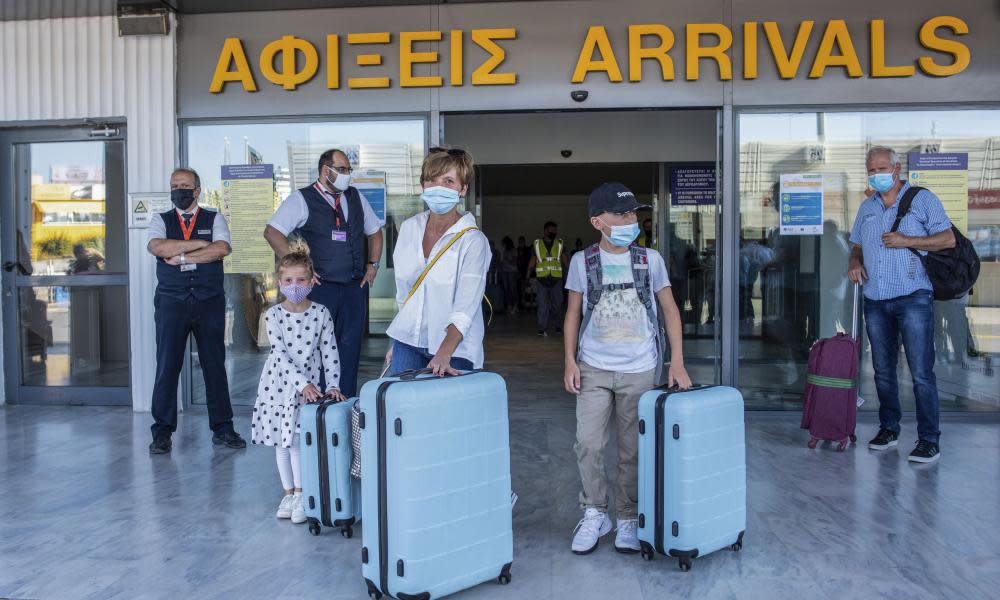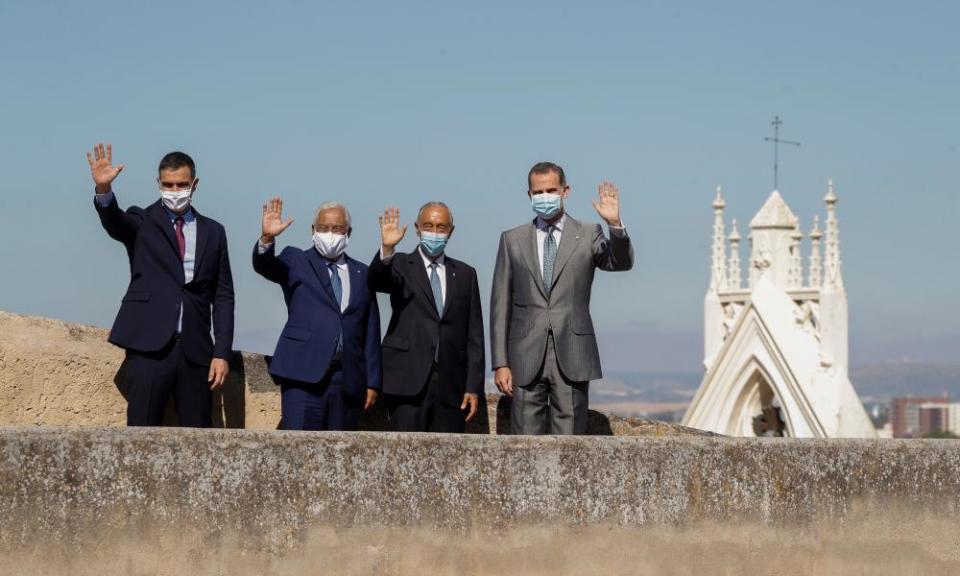Global report: first tourists arrive in Greece as Brazil passes 60,000 deaths

The first tourist flights in four months landed on the Greek island of Crete, and Spain and Portugal reopened their land border as European countries continued to ease travel restrictions, as Brazil recorded 60,000 deaths.
A charter plane carrying 172 passengers from Hamburg landed at Heraklion airport on Crete at 8am, minutes after another aircraft had arrived from the Czech Republic, re-establishing the island’s air links with the outside world.
The airport’s manager, Giorgos Pliakas, told local TV that 40 international flights were expected on Wednesday, with more than 60 scheduled to land at other regional airports around the country including on Mykonos, Rhodes and Kos.
Travellers from the UK and Sweden are not welcome until 15 July, however, and while Wednesday’s arrivals from other EU countries were greeted with traditional music and sweets, they all had to complete an online form 48 before boarding and be prepared to submit to a Covid-19 test on arrival if considered necessary.
All Greek airports are now receiving international flights, and Patras and Igoumenitsa ports will again be welcoming ferries from Italy, but the country’s prime minister, Kyriakos Mitsotakis, told his cabinet on Tuesday he was expecting “a very difficult tourism season. We must do the best we can”.
Meanwhile, in Badajoz, Spain, António Costa, the prime minister of Portugal, and his Spanish counterpart, Pedro Sánchez, reopened the countries’ shared border to travellers for the first time in more than three months in a ceremony also attended by Spain’s King Felipe and Portugal’s president, Marcelo Rebelo de Sousa.

“Our shared prosperity and common destiny within the European project depend on this border being open,” Costa tweeted earlier. “I can’t give you a hug,” Sánchez said apologetically as the mask-clad prime ministers greeted each other in person.
Malta and Croatia also opened their borders to travellers on Wednesday. But Turkey made a point of urging the EU to correct the “disappointing mistake” of excluding it from the bloc’s list of safe coronavirus travel partners, which includes Australia and Morocco but excludes Russia, Turkey and the US.
Beyond Europe, Brazil passed yet another grim Covid-19 milestone with confirmation that more than 60,000 people have died since mid-March.
On Wednesday afternoon, a coalition of Brazilian news outlets announced that the country’s total death toll had risen by 538 to 60,194, meaning it had doubled in the last month.
The number of confirmed infections rose to 1.42 million after 18,428 new cases were reported. That places Brazil behind only the US in terms of both the total number of deaths and cases.
There was no immediate comment from Brazil’s president, Jair Bolsonaro, who has faced domestic and international condemnation for his handling of the crisis.
Bolsonaro’s government announced on Wednesday that it would restrict the entry of foreigners to the country for 30 days. Foreigners with permanent residence in Brazil or working authorisation are exempt, along with foreigners with Brazilian spouses or children.
According to the Johns Hopkins university tracker, Covid-19 has now infected 10,512,383 people globally and killed 512,331. Tedros Adhanom Ghebreyesus, the head of the World Health Organization, said more than 160,000 new cases had been recorded each day over the last week – with half of the total cases recorded since the virus was first detected in Wuhan late in 2019 occurring in the month of June.
Travel restrictions from the pandemic are expected to cost the tourism industry up to $3.3tn (£2.6tn) globally, with the US standing to lose the most, according to a UN study, the Covid-19 and Tourism report by the UN Conference on Trade and Development.
The report sketched three scenarios for the industry, with lockdown measures lasting four months, eight months and 12 months – and revenues predicted to fall by $1.17tn, $2.22tn and $3.3tn respectively. It said the middle scenario could be realistic.
“International tourism has been almost totally suspended, and domestic tourism curtailed by lockdown conditions imposed in many countries. Although some destinations have started slowly to open up, many are afraid of international travel or cannot afford it due to the economic crisis,” it said.
default
The US incurs the highest losses in all three scenarios, with a $187bn drop in tourism revenues in the one lasting just four months, followed by China with $105bn. Thailand and France also stand to lose approximately $47bn each.
But as some countries eased restrictions – Dutch brothels, including Amsterdam’s red light district, reopened on Wednesday – others reimposed restrictions as isolated coronavirus clusters continued to flare.
Switzerland said it would impose a quarantine on individuals returning to the country from high-risk regions as it tries to combat a rising number of cases after phasing out many restrictive measures last month.
In the Portuguese capital of Lisbon, the mayor’s office put up posters amid a rise in infections and reports of parties that have attracted as many as 1,000 revellers. “You know who also never misses an illegal party? The virus,” the posters read.
The country of 10.3 million people recorded 9,441 confirmed cases in June, according to the health ministry, and its per capita rate of new infections now ranks among the highest in Europe, second only to Sweden.
Starting on Wednesday, residents of 19 of the city’s 118 parishes have been ordered to stay in their homes, allowed out only for food or medicine or to travel to work, play sports or care for vulnerable family members. Gatherings are limited to five people in these areas, compared with a 20-person limit in most of the country.

 Yahoo News
Yahoo News 
